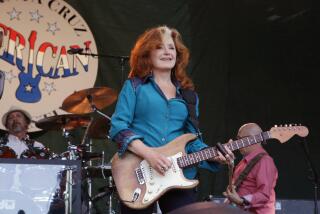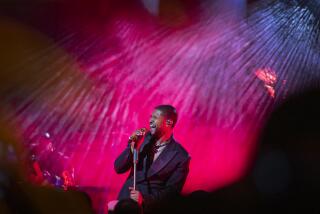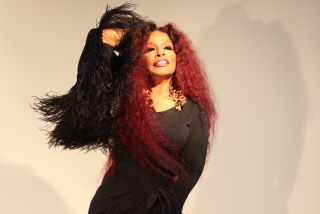Pure purple passion
“He thinks he’s Jesus!” uttered a stunned young observer as Prince -- who did look rather divine in a gold-sequined white tunic and pants -- offered up a particularly rapturous guitar solo early on in his headlining appearance Saturday at the Coachella Valley Music and Arts Festival. This fan was obviously a new member of the Minneapolis master’s flock.
Any serious Prince appreciator knows that at this point he has no need for such sacrilegious delusions. He knows what makes him special. He’s a major innovator of funk, soul and rock; he has composed a great, fat songbook; and he might be the greatest live entertainer of his generation. He doesn’t have to claim Godhead. He’s good enough as is.
Prince does, however, have a few things to check off his list. One, judging by his Saturday night show, was laying claim over this premier American music festival. In recent years, he has worked to reshape the space of pop performance by helping revitalize music in Las Vegas, playing intimate venues and offering lengthy theater runs. It made sense that he’d also want to leave his Zorro-like mark on the thriving concert festival circuit.
His set, executed with a sassy big band that included horns and some earthy backup singers (a nice switch from the fierce but model-like twins he’s recently employed), had two sets of highlights. The first were expected: reunions with breakthrough-era friends Morris Day, Jerome Benton and Sheila Escovedo and inspirational performances of several beloved numbers from that songbook. Yes, he played “Purple Rain.” Yes, he jammed ferociously with the still-dazzling percussionist Escovedo when she sang her Prince-penned hit, “The Glamorous Life.”
The night’s guest spots came early, giving the initial part of the show a slightly overstimulating feel, as if Prince wanted to make sure to hook the crowd before it moved on to the dance tent. Once he made it through “I Feel for You” with no surprise Sheena Easton, though, he flipped the script toward something new -- always a good move for this almost pathologically self-challenging showman
Uncommon numbers from the catalog, including “Cream,” “7” and a vicious, hard-rock version of “Anotherloverholenyohead,” were eclipsed by the two covers he and his band pulled out mid-set. The first already has become this Coachella’s most talked-about moment. Fans gasped when a certain somber chord progression signaled . . . a cover version of “Creep” by Radiohead. Yes, Prince did it, and he changed it from a dissection of self-loathing to an admonition to feel uplifted.
“I wish you were special,” Prince sang, changing Thom Yorke’s first-person wail into a second-person embrace. “I believe you are special.” He also never sang the word “creep,” as far as this critic could hear. That’s not his kind of language.
Prince stepped offstage to change clothes while his band offered another telling cover: a gospel work-up of “Angel” by Sarah McLachlan, with powerhouse belter Shelby J (one of his backup singers) taking over on lead vocals. With these two covers, Prince laid claim to the kings of Coachella past and the queen of another important festival, the now-defunct Lilith Fair.
He also covered the Beatles’ “Come Together,” exhorting concertgoers to help “beat these swords into plowshares.” Not one for explicit political commentary, Prince prefers to reach for a more transcendent goal. “I’m so tired of debates, I can’t stand it any more,” he said, encouraging the audience to participate in an antiwar chant. “All of you young people, are you ready to launch this new golden age?” he asked.
This new blessed period is definitely one in which Prince heals the unwashed (literally, here) with extended guitar solos and polished band jams. His Coachella set wasn’t exactly a miracle. But by the time he said forget the curfew and added the apocalyptic party anthem “Let’s Go Crazy” as an addendum to a glorious “Purple Rain,” the artist had reached his goal of making the festival “Prince’s house.” But did you expect anything different?
The unifying mood Prince’s set promoted has been a relatively rare thing so far at Coachella 2008. It’s a season of reunions, history lessons and revivalists -- with a few exceptions, like the startlingly talented singer-rapper-conceptualist Santogold -- but few acts have really galvanized the masses.
Return visitors M.I.A. and Hot Chip both packed (some in attendance said over-packed) tents, and newbies Sharon Jones and Vampire Weekend made an impression. Yet so far, eclecticism dominates over mass excitement.
Saturday’s other major main-stage artists, Kraftwerk and Portishead, both offered stirring sets that nonetheless remained in the realm of the esoteric. Germany’s electronic music pioneers -- many young artists at this synthesizer-friendly fest owe Kraftwerk a huge debt -- used art museum-quality visuals to enhance its songs, which have transformed from bafflingly unique obscurities to accessible chestnuts over more than 30 years.
Portishead, another notable returning British band along with the Verve and Sunday performers Love and Rockets, Swervedriver and Spiritualized, delivered a strong, nuanced performance that melded cacophony to melancholy. Singer Beth Gibbons has an intriguing, highly dramatic vocal style, influenced by the electronics and jazz guitar of her bandmates. The group’s songs are very dark; often, they lament a bone-deep loneliness. This made for a compelling sonic experience, though not one that exactly brought the large crowd that listened into each other’s arms.
Leave that to Prince -- the generous mood his music always stimulates sent festival-goers on a wave of goodwill. He might not be our savior, but he’s still a number one love man.
--
More to Read
The biggest entertainment stories
Get our big stories about Hollywood, film, television, music, arts, culture and more right in your inbox as soon as they publish.
You may occasionally receive promotional content from the Los Angeles Times.










